
Languages
metrics 2024
Empowering researchers with accessible insights into language studies.
Introduction
Languages, published by MDPI, is a prestigious open-access journal dedicated to the field of Linguistics and Language studies. Since its inception in 2016, this journal has rapidly established itself as a leading platform for high-quality research, achieving an impressive Q1 ranking in 2023 and standing out in both the Arts and Humanities as well as the Social Sciences categories with significant percentile rankings (76th and 74th respectively). Based in Switzerland, Languages fosters an international community of scholars who are committed to exploring the multifaceted dimensions of language, from theoretical frameworks to practical applications. With a robust e-ISSN of 2226-471X, the journal prioritizes accessibility, allowing researchers, professionals, and students to freely engage with cutting-edge research and insights. By bridging the gap between theory and practice, Languages plays a crucial role in advancing our understanding of linguistic phenomena, making it an invaluable resource for anyone invested in the study of language.
Metrics 2024
 -
- 0.90
0.90 -
- -
-Metrics History
Rank 2024
IF (Web Of Science)
JCI (Web Of Science)
Quartile History
Similar Journals
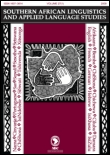
Southern African Linguistics and Applied Language Studies
Advancing Linguistic Knowledge in Southern AfricaSouthern African Linguistics and Applied Language Studies is a prestigious journal dedicated to the exploration and analysis of linguistics and applied language studies within the Southern African context. Published by Taylor & Francis Ltd, this esteemed journal has established itself as a significant platform for scholars and practitioners since its inception in 2003. With an impressive Q2 ranking in the Linguistics and Language category and a current Scopus rank of #430 out of 1167, it occupies a vital position in the academic landscape, appealing to a diverse readership keen on linguistic research, language policy, and applied linguistics. While the journal is not currently open access, it provides comprehensive insights and scholarly articles that foster understanding and innovation in linguistic practices and language education. As of 2024, the journal continues to deepen its impact through rigorous peer-review and a commitment to advancing knowledge, making it a key resource for researchers, educators, and students seeking to navigate the complexities of language within the Southern African region and beyond.
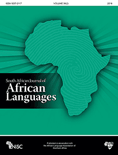
South African Journal of African Languages
Exploring the richness of linguistic diversity across Africa.The South African Journal of African Languages, published by Routledge Journals, Taylor & Francis Ltd, is a premier academic resource dedicated to the advancement of research in the fields of linguistics, language, and literary theory. Since its inception in 1996, this journal has been pivotal in fostering scholarly discourse around African languages, contributing significantly to our understanding of cultural and linguistic diversity across the continent. With its impressive categorization in 2023 as Q2 in Linguistics and Language and Q1 in Literature and Literary Theory, the journal attracts high-quality research and innovative perspectives, positioning itself among the leading publications in the relevant academic arenas. Researchers and students alike will find valuable insights within its pages, as it consistently ranks in the top percentiles of Scopus, notably achieving an 81st percentile in Literature and Literary Theory. The journal is committed to enhancing accessibility to research, although it currently does not offer Open Access options. Its scope includes an array of topics related to language policy, linguistic preservation, and literary critique, making it an essential resource for those engaged in the rich tapestry of African linguistics and literature.

REVUE DE LINGUISTIQUE ROMANE
Deepening Understanding of Linguistic StructuresREVUE DE LINGUISTIQUE ROMANE, published by the esteemed SOCIÉTÉ LINGUISTIQUE ROMANE, is a prominent academic journal dedicated to the exploration of Romance linguistics. With its ISSN 0035-1458, the journal plays a significant role in advancing knowledge within the fields of linguistics and the history and philosophy of science. Although it does not currently offer Open Access, it provides critical insights and peer-reviewed research that are indispensable for scholars, educators, and students interested in the nuances of Romance languages. The journal, which has seen converged coverage from 2006 to 2017, and then again from 2019 to 2021, is ranked in the third quartile (Q3) across various categories within Scopus, reflecting its established presence in the academic community. As a vital resource for interdisciplinary studies, REVUE DE LINGUISTIQUE ROMANE is instrumental for those seeking to deepen their understanding of linguistic structures, cultural nuances, and the historical development of Romance languages.
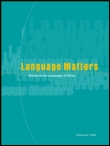
Language Matters
Advancing Knowledge in Linguistics and LanguageLanguage Matters is a prestigious journal dedicated to the dynamic field of Linguistics and Language, published by Routledge Journals, Taylor & Francis Ltd in the United Kingdom. With an ISSN of 1022-8195 and an E-ISSN of 1753-5395, this journal serves as an essential platform for scholars seeking to explore the multifaceted relationships between language and society. Recognized in the 2023 Category Quartiles as Q2 in Linguistics and Language, it boasts impressive Scopus rankings, sitting at #298 out of 1088 in the Arts and Humanities category and #356 out of 1167 in Social Sciences, highlighting its significant impact on the field with a 72nd and 69th percentile ranking, respectively. The journal's scope encompasses a wide range of topics including language acquisition, sociolinguistics, and psycholinguistics, making it a vital resource for researchers, educators, and students alike. By not offering open access, it maintains a curated selection of high-quality peer-reviewed articles, ensuring that academic rigor and relevance are upheld for its readership. With a publication range spanning from 1993 to 2024, Language Matters continues to shape conversations and advance knowledge in the ever-evolving landscape of linguistic research.

Catalan Journal of Linguistics
Unlocking Insights into Linguistic Theory and Practice.Catalan Journal of Linguistics is a distinguished academic publication dedicated to the dynamic field of linguistics and language studies. Published by the Universitat Autònoma de Barcelona, this open-access journal has been disseminating impactful research since 2002, making significant contributions to the understanding of linguistic theory, language acquisition, and sociolinguistics, particularly within the Catalan language context. With a robust engagement in the scholarly community, it proudly holds a Q2 ranking in Linguistics and Language as of 2023, reflecting its commitment to high standards of research and innovation. The journal is accessible to a global audience, promoting the free exchange of knowledge beyond geographical boundaries, and serves as an essential platform for researchers, professionals, and students aiming to stay at the forefront of linguistic inquiry. With its rich archive of articles, the Catalan Journal of Linguistics stands as a vital resource for anyone keen to explore contemporary linguistic issues and advancements.

RUSSIAN LINGUISTICS
Illuminating the intersections of language and psychology.RUSSIAN LINGUISTICS is a peer-reviewed academic journal published by Springer, dedicated to advancing the understanding of the Russian language and its interplay with various linguistic frameworks. With a longstanding history that spans from its inception in 1974, the journal encompasses a broad range of topics within the fields of linguistics and language studies, offering valuable insights especially in *Developmental and Educational Psychology* and the intricacies of linguistics at large. Currently ranked in the Q2 quartile for Linguistics and Language, and holding substantial positions within Scopus rankings, RUSSIAN LINGUISTICS serves as an essential resource for researchers, educators, and students alike, fostering dialogue and collaboration within the international linguistic community. The journal notably provides critical access to research findings that enhance the comprehension of Russian linguistics' role in a global context, despite operating under a traditional access model. For those pursuing scholarly excellence, RUSSIAN LINGUISTICS remains a pivotal platform for disseminating innovative research and promoting the study of language.
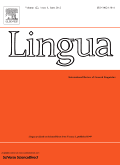
LINGUA
Pioneering research for a deeper understanding of linguistics.LINGUA is a premier academic journal dedicated to the field of linguistics, published by ELSEVIER and based in the Netherlands. With an ISSN of 0024-3841 and an E-ISSN of 1872-6135, this esteemed journal has garnered a reputation for excellence, evidenced by its position in the top Q1 quartile in Linguistics and Language as of 2023. LINGUA serves as a vital platform for scholars, researchers, and students, showcasing innovative research and critical discussions across various linguistic subfields. The journal has demonstrated impressive Scopus rankings—151 out of 1088 for Language and Linguistics, and 176 out of 1167 in Social Sciences—placing it in the 86th and 84th percentiles, respectively. By providing a forum for the dissemination of advanced linguistic theories and their applications, LINGUA continues to significantly contribute to the academic community, making it an essential resource for anyone engaged in the study of language.
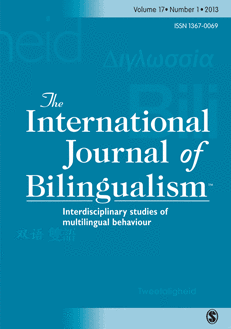
International Journal of Bilingualism
Bridging cultures through bilingual studies.The International Journal of Bilingualism, published by SAGE Publications Ltd, stands as a distinguished forum within the fields of Education and Linguistics, boasting an impressive Q1 ranking in both categories as of 2023. Since its inception in 1997, this journal has been at the forefront of bilingualism research, contributing to a deeper understanding of language use, acquisition, and policy in multilingual contexts. With its ISSN of 1367-0069 and E-ISSN 1756-6878, the journal serves a global audience of researchers, educators, and students dedicated to advancing knowledge in bilingualism. The journal is recognized for its rigorous peer-review process and high impact, indicated by its Scopus rankings, which place it in the top percentile among its peers. Although currently not offered as open access, the International Journal of Bilingualism remains an essential resource for cutting-edge research and dialogue in the dynamic field of bilingual studies, thereby significantly impacting educational practices and language policy decisions worldwide.
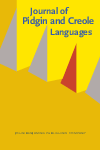
JOURNAL OF PIDGIN AND CREOLE LANGUAGES
Championing Interdisciplinary Insights in Language StudiesJOURNAL OF PIDGIN AND CREOLE LANGUAGES, published by John Benjamins Publishing Co, is a leading international journal dedicated to the study of pidgin and creole languages, offering a unique platform for interdisciplinary research within the fields of linguistics and language studies. With an impressive impact factor reflected in its 2023 Scopus rankings—placing it in the Q2 category for both Linguistics and Language—this journal has established itself as an essential resource for academics and practitioners alike. Covering a broad temporal scope from 1986 to 2024, it promotes innovative research that advances the understanding of language evolution, socio-linguistics, and cultural dynamics. The journal’s focus on both theoretical and practical perspectives makes it particularly valuable for researchers, professionals, and students interested in the complexities of language and identity. Although it does not currently offer Open Access, its commitment to quality scholarship ensures that each issue presents cutting-edge research and critical insights into the world of pidgins and creoles.

Onomazein
Unveiling Linguistic Phenomena for Tomorrow's ScholarsOnomazein is an esteemed academic journal published by the Pontificia Universidad Catolica de Chile, Facultad de Letras, featuring a dedicated focus on the field of Linguistics and Language. With an established presence since 2011, it reaches an international audience and is recognized for its contributions within the Q2 category of Linguistics as per the latest rankings, underscoring its significance in the academic community. The journal holds a commendable position in Scopus, ranking 470th out of 1088 in Arts and Humanities and 549th out of 1167 in Social Sciences, reflecting its relevance and impact in the domain. Although it does not currently offer an open access option, Onomazein remains a critical platform for researchers, professionals, and students seeking to advance their understanding of linguistic phenomena and engage with contemporary debates in language studies. For submissions and more information, please refer to the university’s address at AV Vicuna Mackenna 4860, Santiago, Chile.